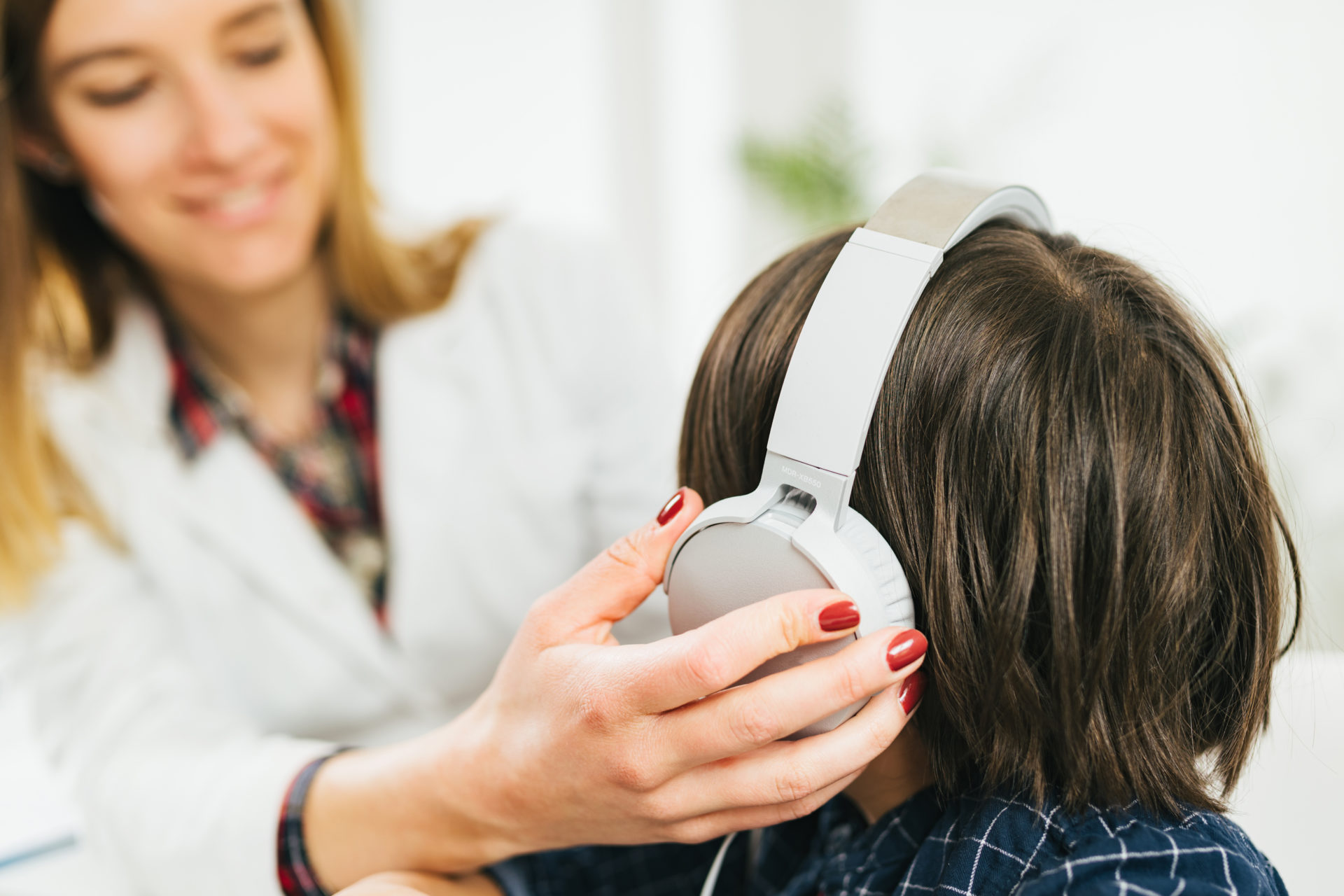Have you noticed a deterioration in your hearing lately? Perhaps you have been missing certain words or sounds when being spoken to. Or maybe you have noticed a blockage which could be making your hearing quieter. If any of these signs resonate with you, you could be due for a hearing test.
Hearing loss symptoms
If you’re unsure as to whether you need a hearing test there are a number of symptoms you can look out for:
- Mishearing or misunderstanding words communicated to you
- Turning up the volume on devices and television consistently
- Often having to ask others to repeat themselves when speaking
- Find it difficult to hear others in noisy areas or around lots of people
These are some of the most common symptoms of hearing loss, if you have been experiencing one or more of these symptoms we recommend you book a hearing test as soon as possible.
If you are experiencing a blocked ear this could also be affecting your hearing and could be an indication to book a hearing test. Symptoms to look out for regarding a build-up of ear wax can include:
- Feelings of blocked / fullness inside the affected ear
- Coughing sporadically
- Dizziness
- Earache
- Pain inside the ear
These are the most common symptoms found when suffering from a blocked ear. If you have found yourself experiencing one or more of these symptoms we highly recommend you book a hearing test to determine if this can be relieved with ear wax removal. You can find out more about our methods of ear wax removal by clicking on the link.
Different types of hearing loss
When suffering from hearing loss it is normal to question why and what might be wrong with your ear(s). Here are the main three types of hearing loss so you can better understand why you might need a hearing test and what the results may mean.
Sensorineural hearing loss
Sensorineural hearing loss occurs through damage to the structures in your inner ear. In the ear, we have small hairs within the cochlea which convert vibrations travelling inside our inner ears into sound waves which our brain then translates into the sounds around us. Yet, when we expose ourselves to very loud sounds these hairs can get damaged.
Sound is measured through decibels, for reference, breathing is around 10 decibels as it is barely audible. Whilst an average office environment is around 58 decibels. Exposure to sounds louder than 85 decibels risk damaging the hairs within the inner ear. When these hairs do become damaged they can lead to hearing loss as the vibrations aren’t as easily picked up, or tinnitus can develop if the vibrations are miscommunicated to the brain.
Many people are only affected by sensorineural hearing loss at a later age around 30-50. This is because hearing loss only begins when around half or more of the hairs are damaged. On average people will be exposed to loud sounds occasionally, and over a period of time this damage can then be visible. However, if a person is exposed to loud sounds very often then hearing loss can occur much sooner since the hairs are damaged within a shorter period of time.
Hearing aids are the most common solution for sensorineural hearing loss. This is because hearing aids can match specific hearing loss symptoms, in addition to matching frequencies around you without affecting other frequencies.

Conductive hearing loss
Rather than hearing loss occurring through damage, conductive hearing loss is a result of the sound energy not being delivered to the cochlea. Therefore in many cases, this is due to a blockage in the ear, mainly due to ear wax.
Our ears naturally produce ear wax in order to keep foreign particles from entering our inner ears. All along our ear canal ear wax is produced through our skin cells, sebum – an oily substance produced to moisturise and protect skin – sweat and dirt. Without ear wax, we would be much more susceptible to infections.
Yet, when ear wax has been built up over a long period of time this can cause a blockage within the middle ear which stops sounds from passing through to the eardrum and cochlea. This is when ear wax removal is necessary.
Ear wax removal methods include irrigation, manual and microsuction. Each method is safe and reliable with each having their own separate benefits.
- Irrigation minimizes the risk of damage to the ear compared to syringing – an unsafe ear wax removal method – as the water is pumped through the ear canal at a controlled rate.
- Microsuction has pinpoint accuracy with a camera fitted into the device. It is regarded as the safest method of ear wax removal.
- Manual ear wax removal is best for removing larger pieces of ear wax within the ear canal yet, it will often be used in conjunction with another advanced method.
Each of these ear wax removal methods are offered within our clinics so we can find the best method for you. Or you may have a preference for which technique you prefer. Click on the link to read more about the different ear wax removal methods.
Mixed hearing loss
Mixed hearing loss is a combination of sensorineural and conductive hearing loss. Therefore, this often mean there is a blockage within the middle ear in addition to hearing loss within the inner ear.
A person suffering from mixed hearing loss is likely to struggle with hearing to a larger extent than just suffering from one type of hearing loss.
For mixed hearing loss both ear wax removal and a hearing aid can be used as a solution. First, the ear wax will be removed from the ear and then a hearing aid can be prescribed depending on the hearing loss damage and personal preference.
What’s included in a hearing test
Here at Hearing Therapy we offer hearing tests which aim to do three things and they are:
Locate the problems
A full examination of your ears will be carried out by one of our professional audiologists, this will include your ear canals and eardrum. A thorough search will allow us to fully understand what may be causing your hearing loss.
We will also conduct a hearing ability check. Hearing ability is recognised through the level of decibels you can hear. For example:
- Mild hearing loss: 20 to 40 decibels hearing loss
- Moderate hearing loss: 41 to 60 decibels hearing loss
- Severe hearing loss: 61 to 80 decibels hearing loss
Anything higher than this is profound hearing loss, at this level of hearing loss it is considered as deaf. Furthermore, although this is a high level of hearing loss you can still benefit from hearing aids. Many major manufactures now offer hearing aids to help those who cannot hear sounds below 81 decibels.
Diagnose issues
After a thorough examination of your ears and hearing our professional audiologist will be able to diagnose your hearing and offer the best possible solution.
Our audiologist will talk through your results with you ensuring you understand what the tests have shown. We want to make sure you understand the situation as much as possible, so you can ask any questions or raise any concerns you may have which our audiologist will be happy to discuss with you.
Offer pathways to better hearing
Finally, we will offer a pathway to better hearing. Depending on what the diagnosis finds on the day of your test we will be able to offer either hearing aids or ear wax removal.
In serious circumstances our audiologists may recommend going to a doctor, this will be in cases where surgery needs to be performed within the ear.

How to prevent hearing loss
To try and prevent hearing loss at an older age it is important to take responsibility for your hearing throughout your life. Loud sounds can’t always be avoided, yet when they can be it is important to look after your hearing.
You can do this through making simple but effective changes to your lifestyle when it comes to hearing, such as:
- Turning down the volume when listening to music (especially through earphones). If you are unsure as to what is a suitable volume level, many smartphones now indicate when the volume is damaging your hearing.
- If you work in loud environments use hearing protection as this can be damaging to your ears over time.
- Don’t use cotton ear buds inside your ear as this can push ear wax further into the ear and risk infection or large blockages.
- Keep volumes low at home on the television or radio in addition to the car. Although these sounds aren’t directly in your ear, they can still be damaging at a high volume.
If you would like to book a hearing test appointment you can click on the link.
